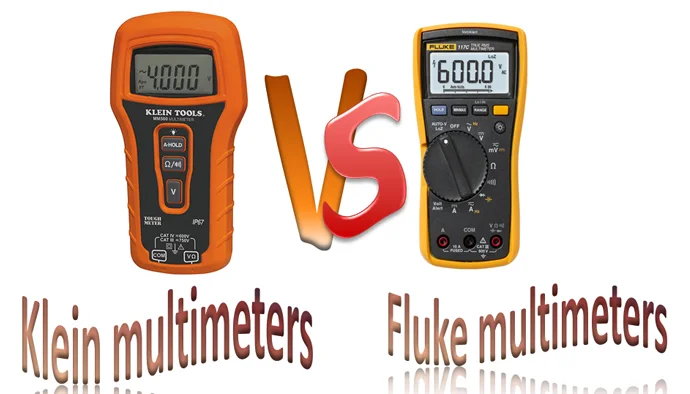Last Updated on January 21, 2023
Multimeters are used for measuring electric current and voltage in an electronic circuit. Multimeters can be analog or digital, the latter being more accurate than the former. A multimeter is often used to identify circuits problems, such as low-voltage, high-current, open circuits, and shorts.
While there are many different brands of multimeters on the market, Klein and Fluke are two of the most popular.
So what’s the difference between these two brands? In this article, we’ll take a look at the features of Klein vs Fluke multimeters and see how they compare.
History of Klein and Fluke
Klein Tools was founded in 1857 by German immigrant Mathias Klein. The company initially manufactured pliers and, over the years, has expanded its product line to include a wide variety of tools, including multimeters.
Fluke Corporation was founded in 1948 by John Fluke. The company initially manufactured electronic test equipment for the aircraft and nuclear industries. In 1977, Fluke released the first digital multimeter, which revolutionized the industry.
Klein vs Fluke Multimeters: How Do They Compare?
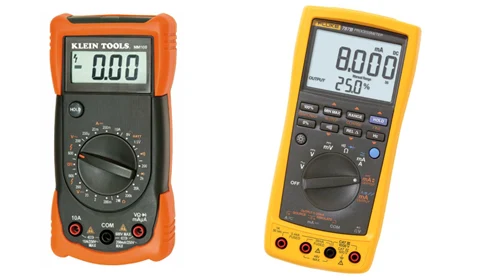
When it comes to features, Klein and Fluke multimeters are fairly similar. Both brands offer digital multimeters with a wide range of functions, including voltage, current, and resistance measurement. However, there are some key differences between the two brands.
1. Reliability:
Fluke multimeters are known for their high quality and reliability. In independent tests, Fluke multimeters have been found to be more accurate and durable than Klein multimeters.
For most people, reliability is the most important factor when choosing a multimeter. If you’re looking for a multimeter to perform reliably in any situation, you can count on it.
2. Design:
Klein multimeters are known for their classic, all-American style. They’re made from high-quality materials and feature a rugged, durable construction.
Fluke multimeters, on the other hand, are more contemporary in design. They’re made from plastic rather than metal, and some people find them less sturdy than Klein multimeters.
3. Purpose:
Klein multimeters are designed for simple, general-purpose use. They’re ideal for home repairs, hobbyists, and factory use.
Fluke multimeters are designed for more advanced users. They’re used by professionals in a variety of industries, including electrical, automotive, and HVAC.
4. Safety:
Both brands of multimeters are safe to use. These are CAT III 600V safety devices. Therefore, you may use them without worry, but you should exercise caution when utilizing them. It would help if you always used a meter for its intended use to keep yourself from getting hurt.
5. Effortless to Use:
Klein multimeters are typically very easy to use. They’re designed with simple, intuitive controls that make them easy to operate.
Fluke multimeters are a bit more complex than Klein multimeters. They typically have more features and functions, making them a bit more challenging to use for some people.
6. Price:
Klein multimeters are typically less expensive than Fluke multimeters. This may be due to the fact that they’re less durable and accurate.
If you’re looking for high quality, durable multimeter, then you may want to consider investing in a Fluke meter. However, Klein meters are a good option if you’re on a budget.
Features of Klein multimeters:
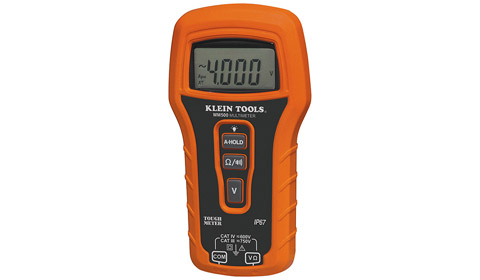
Here are some of the key features of Klein multimeters:
1. Voltage measurement:
Klein multimeters can measure voltage up to 600V AC/DC volts. This makes them ideal for use in a variety of applications, including home repairs, automotive work, and factory settings.
2. Current Measurement:
Klein multimeters can measure current up to 10 amps AC and DC. This makes them ideal for use in a variety of applications, including home repairs, automotive work, and factory settings.
3. Resistance Measurement:
Klein multimeters can measure resistance average 2MOhms resistance. This makes them ideal for use in a variety of applications, including home repairs, automotive work, and factory settings.
4. Continuity Test:
Klein multimeters can perform a continuity test to determine whether two points in an electrical circuit are connected. This is a handy feature for troubleshooting and diagnostics.
5. Diode Test:
Klein multimeters can test diodes to determine whether they’re conducting electricity in the correct direction. This is a handy feature for troubleshooting and diagnostics.
6. Auto Power Off:
Klein multimeters can automatically power off after a period of inactivity. This helps to conserve battery power and extend the life of the meter.
7. Backlit Display:
Klein multimeters have a backlit LCD display for easy viewing in low light conditions. This makes them ideal for use in dark or dimly lit environments.
8. Audible Alerts:
Klein multimeters emit an audible tone when measurements are taken. This makes it easy to determine whether a measurement has been taken quickly.
9. Battery Cell Type:
Klein multimeters use Alkaline cells. This is a common type of battery, which makes it easy to find replacements.
10. Voltage Tester:
Klein multimeters include a voltage tester for easy testing of live circuits. This is a handy feature for troubleshooting and diagnostics.
Features of Fluke multimeters:
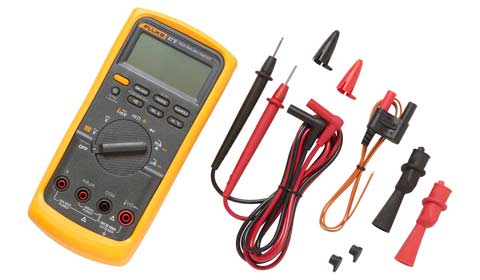
Here are some of the key features of Fluke multimeters:
1. Voltage measurement:
Fluke multimeters can measure voltage up to 1000V AC/DC volts. This makes them ideal for use in a variety of applications, including electrical work, automotive work, and HVAC work.
2. Current measurement:
Fluke multimeters can measure current up to 10 amps AC and DC. This makes them ideal for use in a variety of applications, including electrical work, automotive work, and HVAC work.
3. Resistance measurement:
Fluke multimeters can measure resistance up to 0.2 Ω to 0.5 Ω resistance. This makes them ideal for use in a variety of applications, including electrical work, automotive work, and HVAC work.
4. Continuity Test:
Fluke multimeters can perform a continuity test to determine whether two points in an electrical circuit are connected. This is a handy feature for troubleshooting and diagnostics.
5. Diode Test:
Fluke multimeters can test diodes to determine whether they’re conducting electricity in the correct direction. This is a handy feature for troubleshooting and diagnostics.
6. Batteries Required:
Fluke multimeters use 1 AAA battery. This is a common type of battery, which makes it easy to find replacements.
7. Temperature Measurement:
Fluke multimeters can measure temperature from -40 ℃ to 400 ℃ Fahrenheit. This makes them ideal for use in a variety of applications, including HVAC
8. Auto Power Off:
Fluke multimeters can automatically power off after a period of inactivity. This helps to conserve battery power and extend the life of the meter.
9. Backlit Display:
Fluke multimeters have a backlit LCD display for easy viewing in low-light conditions. This makes them ideal for use in dark or dimly lit environments.
10. Data Logging:
Fluke multimeters can log data to a USB flash drive for easy storage and retrieval. This makes them ideal for use in a variety of applications, including electrical work, automotive work, and HVAC work.
These are just some of the critical features of Fluke multimeters. For a complete list, please consult the Fluke website.
Which Multimeter is Better for You?
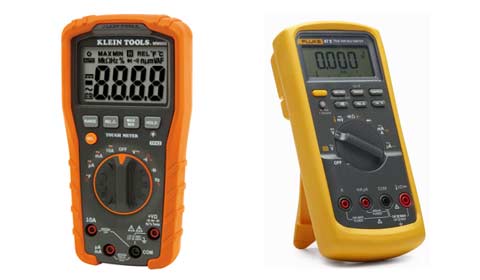
Choosing between a Klein and Fluke multimeter is a matter of personal preference. Both brands offer a wide range of features, which are made to high-quality standards. Ultimately, it comes down to what you need the multimeter for.
A Fluke multimeter is the best choice if you need a meter that can measure voltage, current, resistance, and temperature. If you need a meter that can measure voltage and current, then a Klein multimeter is the best choice.
Consideration Before Buying a Multimeter
When shopping for a multimeter, there are a few things you should consider:
1. Purpose:
If you need a meter for electrical work, you’ll need one to measure voltage, current, and resistance. If you need a meter for automotive work, you’ll need one that can measure voltage and current.
2. Features:
Before buying a multimeter, make sure to read the specs and features carefully. Make sure the meter has the parts you need.
3. Durability:
Multimeters can be subject to many wear and tear, so it’s essential to buy one that is built to last. Look for a meter that is made from high-quality materials and has a robust construction.
4. Price:
Multimeters can vary in price, so finding one that fits your budget is essential. However, it’s important to remember that you get what you pay for. It’s best to buy a meter from a reputable manufacturer, such as Klein or Fluke.
5. Ease of use:
Some meters are more difficult to use than others. Make sure to buy one that is easy to operate.
6. Warranty:
Most meters come with a standard warranty, but some offer extended warranties. It’s essential to check the terms and conditions of the contract before buying a meter.
7. Batteries:
Most meters use standard batteries, such as AAA or 9-volt batteries. Make sure to have a few spares on hand if the meter runs out of juice.
8. Size
Multimeters come in various sizes, so it’s essential to choose one that is comfortable to use. Some multimeters are small enough to fit in your pocket, while others are larger and require a case or holster for storage.
9. Weight
Multimeters also vary in weight, so it’s essential to find one that is comfortable to use over an extended period.
10. Accuracy
One of the most important factors to consider when buying a multimeter is accuracy. Make sure to buy a meter that has been tested and certified to meet industry standards.
FAQs
Which Brand Is Better For Electrical Work?
Klein or Fluke multimeters are both excellent choices for electrical work. However, Fluke multimeters are the better choice if you need a meter to measure voltage, current, and resistance.
How Do You Use A Klein Tool Multimeter?
First, make sure that the batteries are installed correctly to use a Klein tool multimeter. Next, select the type of measurement you want to make. Finally, connect the leads to the points you want to measure and read the results on the LCD display.
Can I Use A Multimeter To Measure Capacitance?
Yes, most multimeters can be used to measure capacitance. However, the accuracy of the measurement may vary depending on the meter.
Conclusion
So, whether you’re looking for a quality multimeter that is built to last or one that is easy to use and fits your budget, Klein and Fluke have you covered. It can be hard to decide which meter is suitable for you with so many options available. But with the information provided in this article, you should be able to make an informed decision about which multimeter is suitable for your needs.
